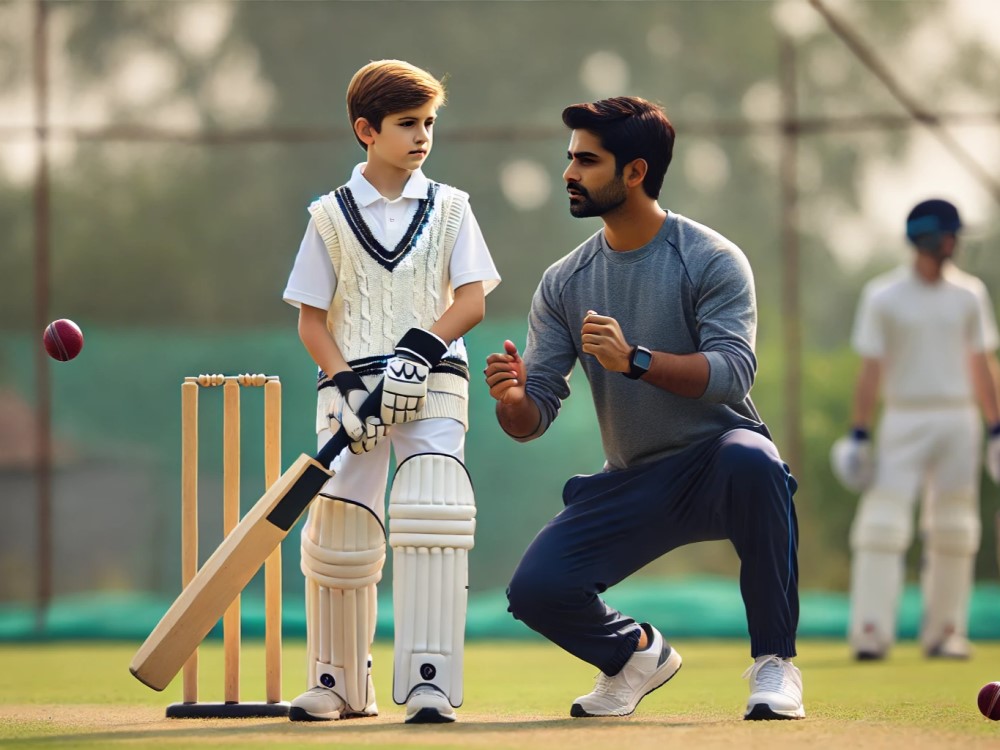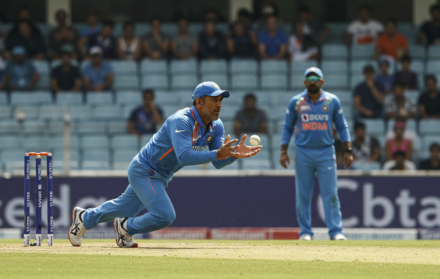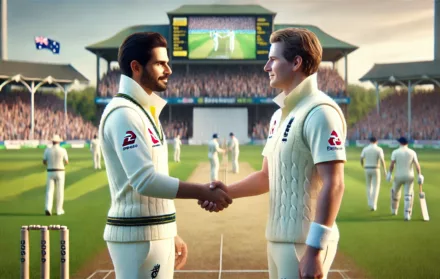
Cricket: A Pathway to Professional Cricket for Kids
Creating a solid pathway to professional cricket for kids involves nurturing talent from a young age and providing the right resources, training, and opportunities. By focusing on foundational skills and structured programs, young players can develop their abilities and aspire to reach professional levels in the sport.
One of the essential elements in this journey is understanding the rules and terminology of cricket for kids. This foundational knowledge is crucial as it helps young players grasp the basics of the game and build a strong understanding of its intricacies.
Effective coaching is also paramount. Utilizing appropriate cricket coaching techniques for kids ensures that young cricketers receive tailored instruction that enhances their skills and fosters a love for the game. This guidance is vital in helping children progress through different skill levels.
Participation in cricket tournaments and leagues for children provides the experience and exposure necessary for young players to compete at higher levels. These tournaments offer a platform to showcase talent and gain recognition, paving the way for future opportunities in professional cricket.
Moreover, developing essential skills through targeted practice is critical. Engaging in activities that focus on cricket skills and drills for young players can significantly enhance their performance. These drills are designed to improve techniques, coordination, and overall gameplay, making players more competitive and proficient.
Parents play a crucial role in this pathway as well. Their parental involvement and support can greatly influence a child’s experience and progress in cricket. Encouraging and actively participating in their cricket journey helps sustain their interest and commitment to the sport.
Ensuring inclusivity and diversity in cricket is also essential for broadening the talent pool. Promoting inclusivity and diversity in kids’ cricket helps create an equitable sport that encourages participation from various communities. This approach ensures that everyone has the opportunity to play and excel in cricket.
As young players develop, they benefit from understanding the mental aspects of the game. Focusing on the mental aspects of cricket helps build resilience, strategic thinking, and a positive mindset, all of which are crucial for long-term success in the sport.
Establishing a clear pathway to professional cricket for kids involves a comprehensive approach that includes foundational knowledge, effective coaching, tournament participation, skill development, parental involvement, inclusivity, and mental training. By providing these resources and opportunities, young cricketers can confidently pursue their dreams of playing professional cricket.
The Importance of Early Training

Early training in cricket is crucial for developing the fundamental skills and understanding of the game that young players need to succeed. Introducing children to cricket at a young age helps them build a strong foundation and fosters a lifelong love for the sport.
When kids start playing cricket early, they have the opportunity to learn and refine the basic skills required for the game. Batting, bowling, fielding, and wicket-keeping are essential skills that need to be developed from a young age. Coaches can focus on teaching proper techniques and correcting any mistakes early on, ensuring that young players develop good habits that will benefit them as they progress.
Early exposure to cricket helps kids understand the rules, strategies, and intricacies of the game. Learning about field placements, game tactics, and scoring systems enhances their cricket IQ and prepares them for competitive play. By watching matches and discussing game scenarios, young players can develop a deeper appreciation and knowledge of cricket.
Cricket is a physically demanding sport that requires strength, agility, and endurance. Early training helps kids develop these physical attributes, improving their overall fitness and coordination. Regular practice sessions and drills enhance their motor skills, balance, and reflexes, making them more proficient players.
Starting cricket at a young age helps kids build mental toughness and resilience. The sport teaches valuable life lessons such as discipline, patience, and handling pressure. Young players learn to cope with success and failure, develop a strong work ethic, and build the confidence needed to compete at higher levels.
Early training establishes a routine that incorporates regular practice and physical activity. This routine becomes a part of the child’s lifestyle, promoting healthy habits and time management skills. Consistency in training is key to long-term development and success in cricket.
When kids are introduced to cricket early, they have more time to develop a passion for the game. Passion drives commitment and perseverance, motivating young players to put in the effort required to excel. A genuine love for cricket keeps them engaged and enthusiastic about their journey in the sport.
Early training in cricket lays the groundwork for a successful pathway to professional cricket. By building basic skills, understanding the game, developing physical and mental attributes, establishing a routine, and fostering passion, young players are well-prepared to progress through the ranks and pursue a professional cricket career.
Essential Skills for Young Cricketers
Developing essential skills is crucial for young cricketers aspiring to reach professional levels. These skills form the backbone of a successful cricket career and need to be nurtured from a young age.
Effective batting requires a combination of technique, timing, and mental acuity. Young cricketers need to learn proper stance, grip, and footwork to play various shots. Coaches should focus on teaching defensive techniques as well as attacking strokes, ensuring that players can adapt to different game situations. Building a strong foundation in batting skills helps players score runs consistently and develop the confidence to face challenging bowlers.
Bowling is a critical aspect of cricket that demands precision, control, and strategic thinking. Young bowlers should be trained in different types of deliveries, such as fast bowling, spin bowling, and swing bowling. Emphasis should be placed on developing a consistent bowling action, understanding line and length, and learning to vary pace and spin. Mastering these skills allows bowlers to take wickets and control the game from the bowling end.
Excellent fielding can make a significant difference in a cricket match. Young cricketers need to develop agility, speed, and hand-eye coordination to excel in fielding. Training should include catching, throwing, and ground fielding drills to improve reflexes and accuracy. Teaching players to anticipate and react quickly to the ball helps them become reliable fielders who can save runs and create opportunities for dismissals.
Wicket-keeping is a specialized skill that requires quick reflexes, agility, and concentration. Young wicket-keepers should be trained in proper stance, glove work, and footwork. Practice sessions should focus on catching behind the stumps, executing stumpings, and handling fast and spin bowlers. Developing wicket-keeping skills enhances a player’s versatility and adds value to the team.
Understanding the game and making smart decisions on the field is crucial for young cricketers. They need to develop game awareness, which includes reading the match situation, strategizing with teammates, and making tactical decisions. Coaches should encourage players to think critically, analyze their performance, and learn from each game. Building game awareness helps players become intelligent cricketers who can adapt to different scenarios.
Cricket demands a high level of physical fitness, and young cricketers need to prioritize their fitness training. Strength, endurance, flexibility, and agility are essential attributes for success in cricket. Regular fitness routines, including cardio exercises, strength training, and flexibility workouts, help players stay in peak condition. Maintaining physical fitness reduces the risk of injuries and enhances overall performance on the field.
Cricket is a mentally challenging sport that requires focus, resilience, and a positive mindset. Young cricketers need to develop mental toughness to handle pressure, setbacks, and competition. Techniques such as visualization, mindfulness, and goal setting can help players stay mentally strong and focused. Building mental toughness ensures that young cricketers can perform consistently and handle the demands of the game.
By focusing on these essential skills, young cricketers can lay a solid foundation for their journey to professional cricket. Mastering batting, bowling, fielding, wicket-keeping, game awareness, physical fitness, and mental toughness prepares players for the challenges and opportunities that lie ahead in their cricket careers.
The Role of Grassroots Programs

Grassroots programs play a vital role in developing young cricketers and nurturing their talent. These programs provide the necessary support, training, and opportunities for kids to learn and grow in the sport. Here’s how grassroots programs contribute to the development of future professional cricketers:
Grassroots programs make cricket accessible to a wide range of children, regardless of their background or circumstances. By offering free or low-cost programs, providing equipment, and using community spaces, these initiatives ensure that all kids have the opportunity to play cricket. Inclusivity is key to discovering and nurturing talent from diverse backgrounds.
Grassroots programs offer structured coaching sessions led by qualified coaches. These sessions focus on teaching the fundamental skills of cricket, including batting, bowling, fielding, and wicket-keeping. Coaches provide personalized feedback and guidance, helping young players improve their techniques and develop their game. Structured coaching ensures that players receive consistent and high-quality training.
Participating in competitive matches is essential for the development of young cricketers. Grassroots programs organize local leagues, tournaments, and matches that give kids the chance to compete and test their skills. These competitive opportunities help players gain match experience, build confidence, and learn to handle pressure. Regular competition is crucial for identifying and nurturing talent.
Grassroots programs play a key role in identifying talented players and providing them with development pathways. Coaches and scouts keep an eye out for promising players during training sessions and matches. Identified talents are then given additional training, opportunities to play at higher levels, and access to development programs. Talent identification ensures that gifted players receive the support they need to reach their potential.
Grassroots programs foster community engagement and create a supportive environment for young cricketers. Involving parents, schools, and local organizations in the programs helps build a sense of community and encourages participation. Community support is crucial for the success of grassroots initiatives, as it provides resources, volunteers, and a positive atmosphere for the kids.
Beyond cricket skills, grassroots programs teach valuable life skills and values. Teamwork, discipline, respect, and perseverance are some of the important lessons that kids learn through cricket. These programs emphasize character development and help young players grow into well-rounded individuals. The values and skills learned through cricket are applicable both on and off the field.
Grassroots programs create clear pathways for young players to progress to higher levels of cricket. From local leagues to regional academies and national teams, these pathways ensure that talented players have opportunities to advance. Grassroots programs often collaborate with cricket boards, clubs, and academies to provide a seamless transition for players aiming to reach professional cricket.
Grassroots programs are the foundation of cricket development, providing the necessary support, training, and opportunities for young players. By making cricket accessible, offering structured coaching, organizing competitive opportunities, identifying talent, engaging the community, teaching life skills, and creating pathways to professional cricket, grassroots programs nurture the next generation of cricketers and ensure the sport’s continued growth and success.
Supportive Environments for Young Cricketers
Creating supportive environments is essential for the growth and development of young cricketers. These environments provide the encouragement, resources, and guidance that kids need to thrive in the sport. Here’s how different elements contribute to creating supportive environments for young cricketers:
Parents play a crucial role in the development of young cricketers. Their encouragement, involvement, and support can significantly impact a child’s cricket journey. Parents should provide positive reinforcement, attend matches and training sessions, and help with logistics such as transportation and equipment. Constructive feedback and a balanced approach to winning and losing help kids stay motivated and enjoy the game.
Schools can create supportive environments by integrating cricket into their sports programs and providing flexible academic schedules for young cricketers. Offering cricket as part of the physical education curriculum and organizing school teams and competitions foster interest and participation. Academic support, such as tutoring and flexible study plans, ensures that young cricketers can balance their studies and sports commitments effectively.
Qualified coaches and mentors are essential for guiding young cricketers. Coaches should focus on skill development, providing personalized feedback, and creating a positive learning environment. Mentors, including experienced players and coaches, can offer valuable insights, advice, and encouragement. Building strong relationships with coaches and mentors helps young players navigate their cricket journey and overcome challenges.
Access to quality facilities and resources is vital for the development of young cricketers. Training grounds, practice nets, and indoor facilities provide the necessary infrastructure for regular practice and skill development. Access to proper cricket equipment, such as bats, balls, protective gear, and training aids, ensures that players can train safely and effectively. Investing in facilities and resources is crucial for creating a conducive environment for cricket.
A positive team culture and peer support can enhance the cricket experience for young players. Encouraging teamwork, camaraderie, and mutual respect within the team creates a supportive atmosphere. Peers can motivate each other, provide constructive feedback, and celebrate successes together. Building a strong team culture fosters a sense of belonging and enhances overall performance.
Cricket can be mentally and emotionally challenging, and young players need support in these areas. Providing access to sports psychologists, counselors, and mental health resources can help players manage stress, anxiety, and pressure. Encouraging open communication and creating a safe space for players to express their feelings and concerns is essential. Mental and emotional support ensures that young cricketers can maintain a positive mindset and overall well-being.
Local cricket clubs and community organizations play a significant role in supporting young cricketers. Clubs can offer regular training sessions, organize matches and tournaments, and provide access to facilities and coaches. Community support, including volunteers, sponsors, and fans, creates a positive and encouraging environment. Engaging with the community builds a strong support network for young players.
Creating supportive environments for young cricketers involves the combined efforts of parents, schools, coaches, mentors, facilities, peers, mental health resources, and the community. By providing the necessary encouragement, resources, and guidance, these elements contribute to the holistic development of young players, helping them achieve their potential and enjoy their cricket journey.
Cricket: A Pathway to Professional Success for Young Players

Cricket serves as an effective pathway to professional cricket for kids, offering them opportunities to develop their skills, build character, and pursue their dreams. Early training, essential skills development, grassroots programs, and supportive environments are key components of this journey. By focusing on these elements, young cricketers can navigate their way from the grassroots to professional levels, equipped with the skills, knowledge, and support they need to succeed.
Investing in early training helps build a strong foundation for young players. Introducing kids to the sport at an early age allows them to develop basic techniques and a deep understanding of the game. This early exposure fosters a lifelong passion for cricket and sets the stage for future success. Training sessions designed to be engaging and fun ensure that children remain interested and motivated to improve their skills.
Developing essential skills is crucial for young cricketers to be well-prepared for the challenges ahead. Mastering batting, bowling, fielding, and strategic thinking requires dedicated practice and guidance from knowledgeable coaches. Skill development programs that focus on these core aspects of the game enable young players to compete effectively at higher levels and adapt to the evolving demands of cricket.
Grassroots programs provide the necessary infrastructure, coaching, and competitive opportunities, nurturing talent and promoting inclusivity. These programs are the backbone of cricket development, offering accessible entry points for children from diverse backgrounds. Quality coaching, well-maintained facilities, and regular competitive matches are essential for identifying and honing talent at the grassroots level. Such initiatives ensure that cricket remains an inclusive sport, welcoming all who wish to play.
Creating supportive environments, both at home and in the community, fosters the growth and well-being of young cricketers. Encouragement from parents, schools, and local clubs plays a significant role in a child’s cricketing journey. Positive reinforcement, emotional support, and constructive feedback help young players navigate the ups and downs of the sport. A nurturing environment boosts their confidence and resilience, essential traits for success in professional cricket.
The journey to professional cricket is not just about technical skills; it’s also about passion, dedication, and perseverance. Encouraging young players to love the game, supporting them through successes and setbacks, and providing opportunities for growth are crucial for their development. As cricket continues to evolve and grow, the combined efforts of parents, schools, coaches, clubs, and communities will play a pivotal role in shaping the future of the sport.
By prioritizing early training, skill development, grassroots programs, and supportive environments, we can ensure that cricket remains a vibrant and accessible pathway to professional cricket for kids. The future of the sport depends on nurturing young talent, promoting inclusivity, and fostering a love for the game. Through these efforts, we can inspire the next generation of cricketers and ensure the continued success and growth of cricket worldwide.





